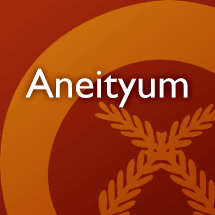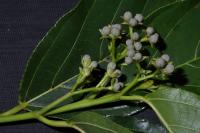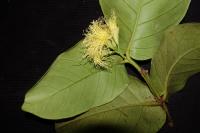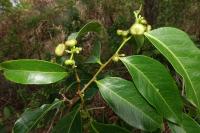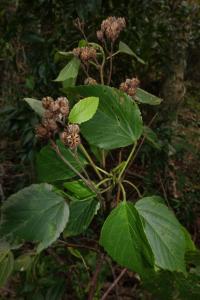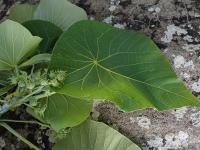Your search for * in fuel has returned 60 entries
fetofeto
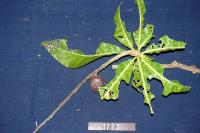
inciñpiñti
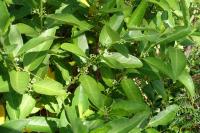
inciñyiñpa
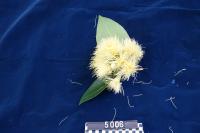
incipinti
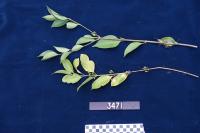
n. shrub, 2. 5 m tall (collection: Gregory M. Plunkett #3471)
Example: 1. The fruit of this species are poisonous. In ancient times the ancestors used the "fork" (branch growing out of main stem) of this wood to catch lobsters between the two parts of the stem. 2. Fertilizer for taro, in case you are not cleansed, it is ok as this plant as fertilizer will cleanse you.
bookmarkincipinti
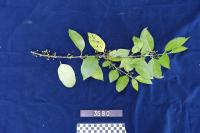
incipiñti
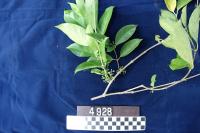
incipiñti
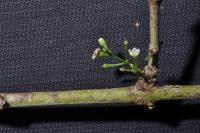
inmac
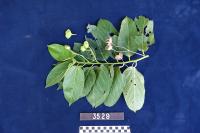
inmac
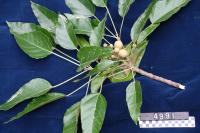
n. tree to 10 m, dbh 1 m (collection: Michael J. Balick #4991)
Example: The young trees are a good source of lumber as they are straight and can be used as poles or sawn timber. This tree is also a source of firewood and is known to be easy to light and burns well. The fruits are a source of oil. Collect the ripe fruits, remove the seeds from the shell, macerate the seeds to release the white endosperm inside, place this in a pot without water and heat it. The brown-yellow oil will come out from the crushed fruits. It is good for using on the body but not edible. It is a good massage oil, or to lubricate the skin or to heal small wounds. For the latter, drop some oil on the wound once daily until the wound heals.
bookmarkinmopoñ
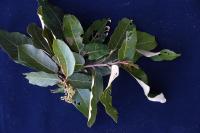
n. tree, 10 m tall (collection: Gregory M. Plunkett #3516)
Example: The young stems are used to make fishing spears. These stems are also used to make the poles that connect an outrigger to a traditional canoe, as they are light and strong. The large trees have extensive roots and stumps and are used as a pen for pigs by making a fence from these.
bookmarkinmoupog
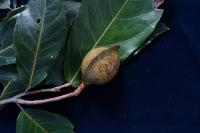
n. tree to 8 m, dbh 20 cm (collection: Michael J. Balick #4927)
Example: The wood of this tree is used as firewood. Children collect the dry fruits and use them for decorations and toys, for example playing with a fruit on the beach, driving it as if it were a toy truck or boat (photo).
bookmarkinp̃alanhas
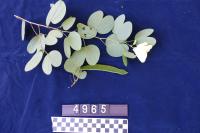
intoutau
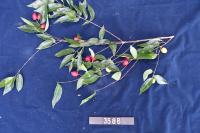
n. tree, 14 m tall (collection: Gregory M. Plunkett #3586)
Example: To make a fire, take a 1-2 cm diameter stick, sharpen it and rub it against a larger piece, ca. 6 cm in diameter. As a person rubs, the stick will start smoking and then start a fire, especially if there are a few small slivers of stem on the stick that can catch fire. People use other types of sticks to rub against the larger piece as well, and this will make a fire.
bookmarkintoutau
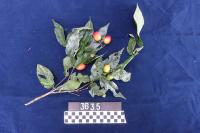
n. tree, 7-8 m tall (collection: Gregory M. Plunkett #3635)
Example: The wood from this tree is used for house posts. Used to heal bad spirits, headaches, fever, or any other kind of illness that modern medicine cannot fix. Must be taken and performed in the evening before the sun sets. Take four leaves from the top of the intoutau, netethae, nelmaha, inrowod plants. Combine them with 1/4 cup of water and squeeze the juice out of the leaves and pour into a piece of bamboo. Give the mixture to the sick person to drink. The woman must drink half of the mixture and use the other half of the mixture to wash their body with. The woman then has to stay away from other people except for those who helped wash her. Then you must smash the bamboo that contained the mixture where the sun sets.
bookmarkinwoapeñ
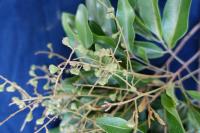
inya
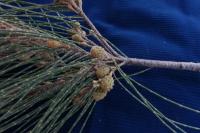
n. large tree, 16 m tall (collection: Gregory M. Plunkett #3222)
Example: 1. As a child’s game, some times children put the segments of the needles together to see who can make the largest one. 2. A "calendar plant"--when the needles are brown, it is an indication that people should not work hard, but should rest or they will not feel well. If they try to work they will feel sleepy--an indication of the season of higher heat. 3. Wood is used as firewood. 4. Firewood, inner bark good for ciguatera poisoning, scratch the inner bark and squeeze juice into a cup of water and give to the sick person to drink – very effective. Use the largest most mature part of the stem.
bookmarkinyehec
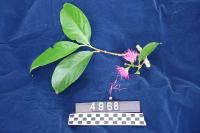
n. tree to 7 m, dbh 20 cm (collection: Michael J. Balick #4968)
Example: The fruits are edible when they are red. If a person has been drinking kava and the next morning feels hung over, they can take a handful of the leaves of this plant, crush them in cool water, and wash their face with this. This treatment will help the kava feeling to disappear. At the same time, if a person eats the fruit of this tree a few hours in advance of planning to drink kava, they cannot drink kava as it will reduce the effects of the kava. The trunk of this tree can be used to build temporary houses and also it is good for firewood. When the plant is in flower, flying foxes and birds come to drink the nectar and hunters know this so they hunt near this tree.
bookmarkmuri muri
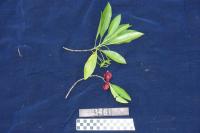
muri muri
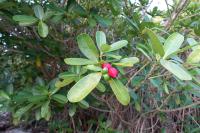
murimuri
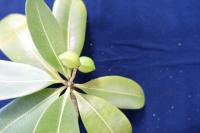
nafanu
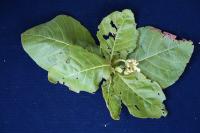
n. tree, 3-4 m tall (collection: Gregory M. Plunkett #3570)
Example: This plant grows in coastal areas, and is a good source of firewood. It can be used for house posts. The leaves are used as an unspecified medicine. There is a belief regarding the black and white sea snake, that represents a seawater spirit. Mix this with other unspecified leaves, mash together, squeeze into a bamboo tube and fill it. Give it to a woman to drink to keep the evil snake spirit away. The same preparation can be used to treat toothache, caused by the seawater spirit. "The spirit can trick you into going to fish every day."
bookmarknafanu
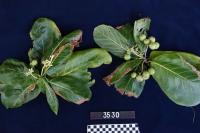
n. tree, 6 m tall (collection: Gregory M. Plunkett #3530)
Example: This plant grows in coastal areas, and is a good source of firewood. It can be used for house posts. The leaves are used as an unspecified medicine. There is a belief regarding the black and white sea snake, that represents a seawater spirit. Mix this with other unspecified leaves, mash together, squeeze into a bamboo tube and fill it. Give it to a woman to drink to keep the evil snake spirit away. The same preparation can be used to treat toothache, caused by the seawater spirit. "The spirit can trick you into going to fish every day."
bookmarknafanu
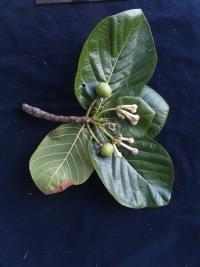
n. tree. Growing on the coast. (collection: Ashley A McGuigan #23)
Example: 1. To cure the sea snake (nispev) curse that causes missed periods. First the husband must combine 4 young leaves of incispev and 4 young leaves of nafanu and mash and squeeze the juice into a small bamboo (1-1.5 inch diameter) The nafanu is important because it is a plant that connects to the sea. Use wildcane leaves cover the bamboo closed. Go to the sick person and unwrap the snake from her. Start from the top and let the woman drink a small part of the potion then wash her with the mixture, making sure to wash head, elbows, knees, feet, and belly. Then take a leaf of naha and break it over the woman’s belly button to break the snake off. Smash the bamboo vessel to pieces. Leave the woman there until the wash dries on her. This takes one whole day and the ceremony in the evening so she can sleep and she must not eat. This ritual is performed by men. 2. Firewood, house post for bush house.
bookmarknairum̃an
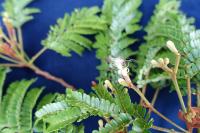
nala
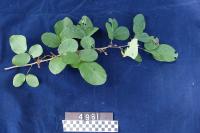
n. shrub to 2 m, coastal vegetation (collection: Michael J. Balick #4961)
Example: The stem of this plant is used for firewood. If a person has been drinking kava and the next morning feels hung over, they can take a handful of the leaves of this plant, crush them in cool water, and wash their face with this. This treatment will help the kava feeling to disappear.
bookmarknala
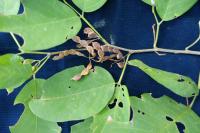
n. tree to 7 m, dbh 20 cm (collection: Michael J. Balick #4860)
Example: This is a common tree. If a person travels from one district to another on Aneityum, and you see the tree planted in that other district, a person knows they are free to come into this area. When the leaves are yellow, as in a young tree, the local name is nala’gay. If a person carries a branch of this tree into a village it is a symbol that the person is coming with peaceful intentions.
bookmarknala
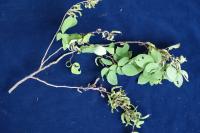
nala
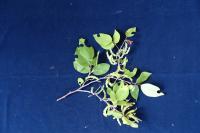
nala
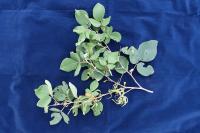
n. shrub, 1. 5 m tall (collection: Gregory M. Plunkett #3217)
Example: 1a. When traveling past a community you can place these leaves in a basket or walk with it in your hand. In this way people in the community know that you are traveling in peace and will cause no harm to people in that village. 1b. Message plant – if you go to visit someone and they are not there, you leave a branch of this on the door or somewhere they can see it and they know that some relatives have come and tried to visit them.
bookmarknamlau
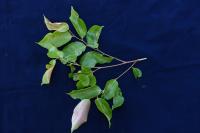
n. shrub, 2 m tall (collection: Gregory M. Plunkett #3485)
Example: 1. The larger stems of this plant can be used to build houses, for rafters. 2. It is also a good source of firewood. 3. Ancestors, before go to chief’s canal and want to talk about a complicated issue – a person would cut a branch and bring it to the sea and tap the water surface and would say what he wants, ask that he would want that issue to be solved and that others would follow his ideas and then go back to the meeting place and take stick, keep wind at his back, moving stick in all directions and then he will convince the people of his ideas. This is done by the chief’s spokesman. Helps convince the opposition. Helps keep power in hands of parent(??) chief rather than subchiefs who might have other ideas.
bookmarknamlau
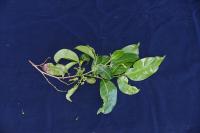
n. shrub, 2 m tall (collection: Gregory M. Plunkett #3490)
Example: 1. The larger stems of this plant can be used to build houses, for rafters. 2. It is also a good source of firewood. 3. Ancestors, before go to chief’s canal and want to talk about a complicated issue – a person would cut a branch and bring it to the sea and tap the water surface and would say what he wants, ask that he would want that issue to be solved and that others would follow his ideas and then go back to the meeting place and take stick, keep wind at his back, moving stick in all directions and then he will convince the people of his ideas. This is done by the chief’s spokesman. Helps convince the opposition. Helps keep power in hands of parent(??) chief rather than subchiefs who might have other ideas.
bookmarknamlau
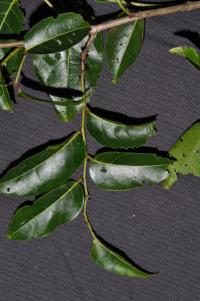
namlau or nida
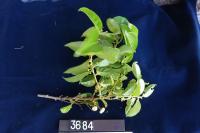
namrop̃om
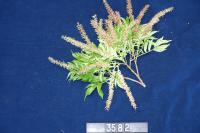
n. tree, 7-8 m tall (collection: Gregory M. Plunkett #3582)
Example: Firewood, timber good for bush houses. Calendar plant – when it is in flower, the old people know it is time to harvest root crops, like yam and other vine crops, in the wild, as yet unspecified. Local names = INYAC, NOMODEJ TAL, NOMODEJ WOU, NOU LELCEI… etc.
bookmarknanec
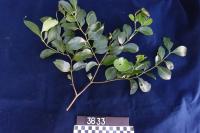
n. tree, 7 m tall (collection: Gregory M. Plunkett #3633)
Example: To cook Alocasia (wild taro), use the dry wood of this plant as firewood. The leaves of this plant are also used to line the earth oven on top of the food and on bottom of the food to insulate it from the high heat of cooking.
bookmarknap̃ojev
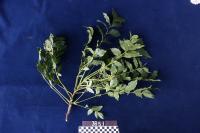
n. well branched tree, 14 m tall (collection: Gregory M. Plunkett #3651)
Example: Poles made from this plant are used for house rafters and burned for firewood. To plant taro in a swampy area, collect the leaves of this species and put them in the hole where the taro is to be planted, mix with a bit of soil and then plant the taro on top of that. Leaves are a type of fertilizer. Used when baking with the earth oven. Hot stones cover the food and then the leaves from this plant cover the stones. The leaves stay on the branch.
bookmarknapojev
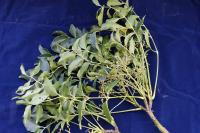
n. tree to 5 m, dbh 10 cm (collection: Michael J. Balick #4889)
Example: The leaves are used to cover meat when baking it in a stone oven (inmawum). This will soften the meat and keep it moist. Used when other species of this genus are not available, for example if you are in the bush.
bookmarknap̃ojev
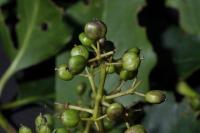
nednaeñ
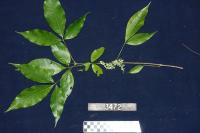
nemla
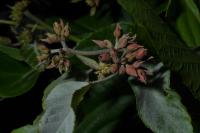
n. tree, 4 m tall (collection: Gregory M. Plunkett #4127)
Example: 1. This wood can be used to start a fire, where there are no matches. Two dried pieces of wood are rubbed vigorously together to create tinder. The tinder is then added to dried material in order to start a fire. 2. The wood of this plant is used as rafters in traditional houses.
bookmarknetcetas
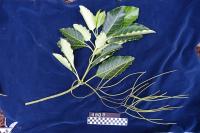
netcetas
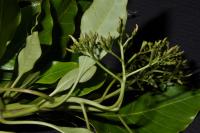
n. well branched tree, 15 m tall (collection: Gregory M. Plunkett #4084)
Example: 1. The name means "explosion". Further information about the plant withheld.
bookmarknetcetec
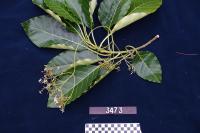
n. trees, 3-4 m tall (collection: Gregory M. Plunkett #3473)
Example: 1. This species is excellent for firewood as it gives off less smoke than other types of wood. 2. The wood is good for making roof rafters on which to tie thatch. 3. Use this for planting pole, for taro, cane, and kava.
bookmarkniditau
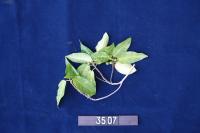
n. tree, 3 m tall (collection: Gregory M. Plunkett #3507)
Example: The young leaves and fruits are edible; the fruits are eaten ripe. This species is used for firewood as well as house posts, but they don’t last as long as other types of wood so they are used in temporary structures. A sacred plant on Aneityum. Name means linkage between this world and the spirit world. Agriculture – you find this tree ?? it means that the land is fertile. Birds eat fruits; people burn the tree to release ash and fertilizer and grow their taro around it – it will give more food. Message plant – if someone puts a long brown on your door or in your garden, it means “why are you here?” Implies that you should go back to where you belong. You don’t belong in this place. For example instead of quarreling over land dispute, put the branch and it means that you should leave this place.
bookmarkniditau
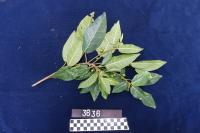
n. tree, 8 m tall (collection: Gregory M. Plunkett #3636)
Example: The green fruits are edible, as are the young leaf apices--cook these in water and eat them. The wood is used for temporary houses, for example, to provide shade in a garden. For planting taro, or any root crop, sharpen the end of a stick of this tree and use it for making holes, particuarly in river sand where some crops are planted. This tree grows near the river and is an indication that this land is good for agriculture. The wood from the tree is very good for firewood. Name means "who are you." Plant used as an indicator of a tabu place. Take a branch and put it where another person is building or gardening and there is a dispute over that area of land. When this plant is placed there the person who is using the land should stop working it.
bookmarkniditau
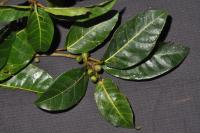
niditau
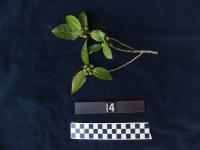
n. tree. Found in the village. (collection: Ashley A McGuigan #14)
Example: The young leaves and fruits are edible; the fruits are eaten ripe. This species is used for firewood as well as house posts, but they don’t last as long as other types of wood so they are used in temporary structures. A sacred plant on Aneityum. Name means linkage between this world and the spirit world. Agriculture – you find this tree growing, it means that the land is fertile. Birds eat fruits; people burn the tree to release ash and fertilizer and grow their taro around it – it will give more food. Message plant – if someone puts a long brown on your door or in your garden, it means “why are you here?” Implies that you should go back to where you belong. You don’t belong in this place. For example instead of quarreling over land dispute, put the branch and it means that you should leave this place.
bookmarkniditau
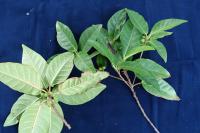
n. tree to 8 m, dbh 20 cm (collection: Michael J. Balick #4867)
Example: Fruits are sweet and edible when ripe. This plant is an indicator of rich soil, a good place to plant one’s garden. The leaves of this species are mixed in with other leaves for an unspecified local medicine that helps to remove spiritual sickness
bookmarknidnaiñ
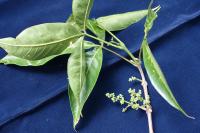
nihivaeñ p̃ap̃
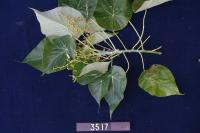
n. tree, 4 m tall (collection: Gregory M. Plunkett #3517)
Example: 1. The leaves of the young plant are used to wrap food for cooking on a fire. 2. The wood is used for temporary houses, for making rafters that are said to last a long time. 3. The wood is strong and used to carve paddles for the canoe. 4. It is also grown and used for firewood. 5. Firewood, (6) use as local plate. 7. On west side of island, take old coconut, fill with water, put lead into hole on end, take out and give to baby to drink and it will help the baby talk.
bookmarknomrop̃om̃
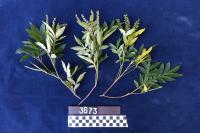
nomropom
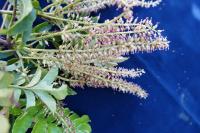
n. shrub to 2 m, flowers white (collection: Michael J. Balick #4874)
Example: This plant is an indicator of rich soil, especially up on the hills from the coast. Therefore, this is where people choose to do their gardens. This specimen is in red soil that is not rich so it does not grow tall, but in the mountains it does grow tall and that is where gardens are planted. Wood from the tree is used for carving.
bookmarknop̃ou
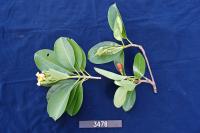
n. large epiphyte on dead tree, growing in open forest. (collection: Gregory M. Plunkett #3478)
Example: The wood of this plant is very hard and can be used for house posts. Because the wood is somewhat heavy, younger stems can be sharpened at one end and the pole can be used to plant dryland taro, to make holes for the tubers. For planting swamp taro, the leaves can be used to line the pit that the taro is planted in; it is a local fertilizer for the taro, and as it rots the soil becomes soft while the taro is growing. The flowers are placed behind one’s ear to enjoy the fragrance or can also be used to make a floral necklace (Intañ).
bookmarknopou
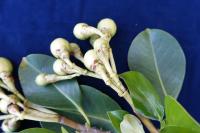
n. tree to 5 m, dbh 10 cm (collection: Michael J. Balick #4881)
Example: The wood of this tree is used to make house-posts, it is strong. The leaves are used as a compost for the taro patch; line the hole with the leaves of this tree, then place soil over that and plant the taro. When the fruits are ripe, local people say that the hermit crabs are "fat" and ready to collect and eat. When a person is in the forest and there is no coconut fruit fiber to start a fire with, use a dry stick, shave it and use a match to start a pile of this tinder to make a good fire. The wood is said to be "oily." This gives it a nice aroma. To perfume coconut oil, drop the dry flowers in it--use 1 handful of dried flowers added to a pot of oil boiling on the fire while making it. Strain out flowers and the oil smells good. Flowers can also be added to the oil once it is bottled to perfume it.
bookmarknop̃ou
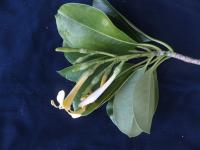
n. tree. Found in the village, usually grows in the hills. (collection: Ashley A McGuigan #16)
Example: 1. Lot of oil in the heartwood so it is good to start a fire, split it into small strips and you can light it for a fire. 2. Calendar plant – when the fruits ripen people know that this is the best season to eat the big hermit crab – meaning that they are fat.
bookmark